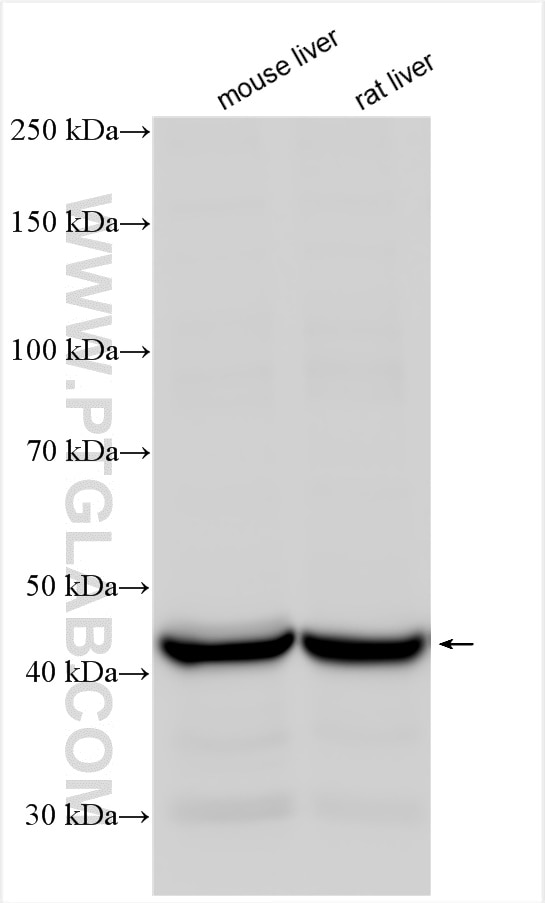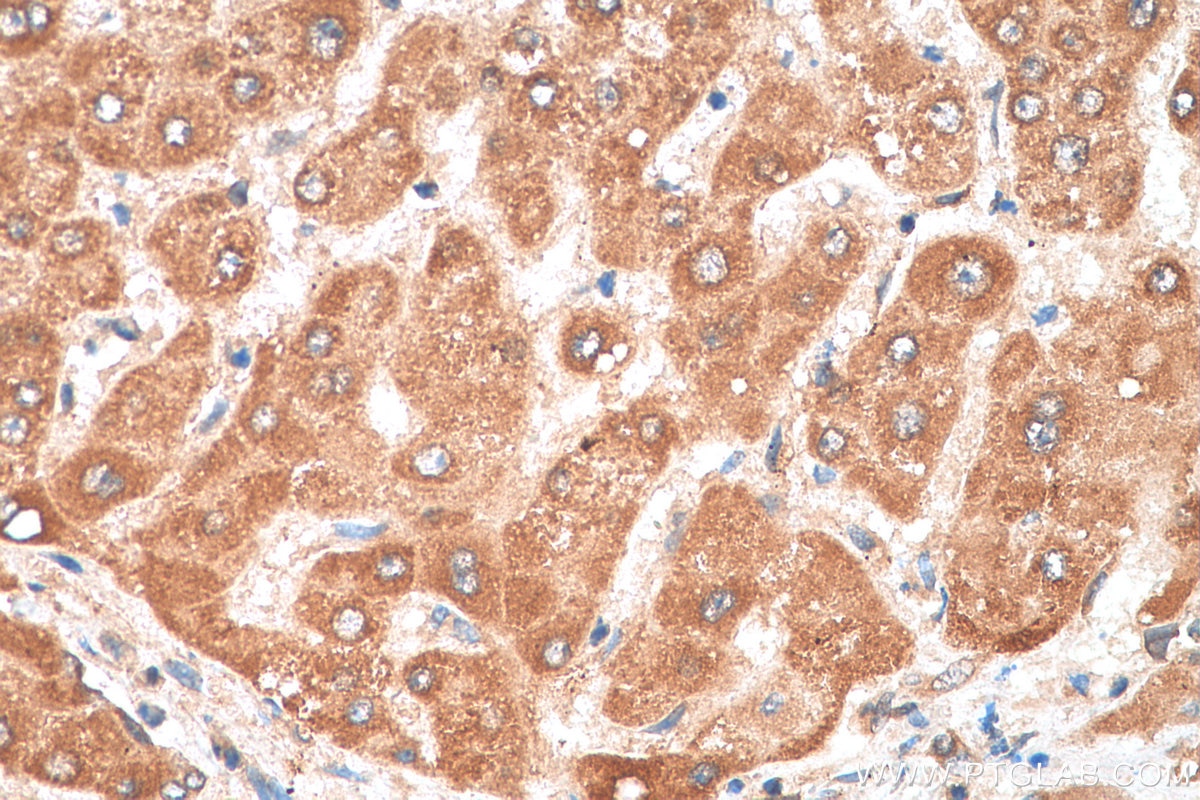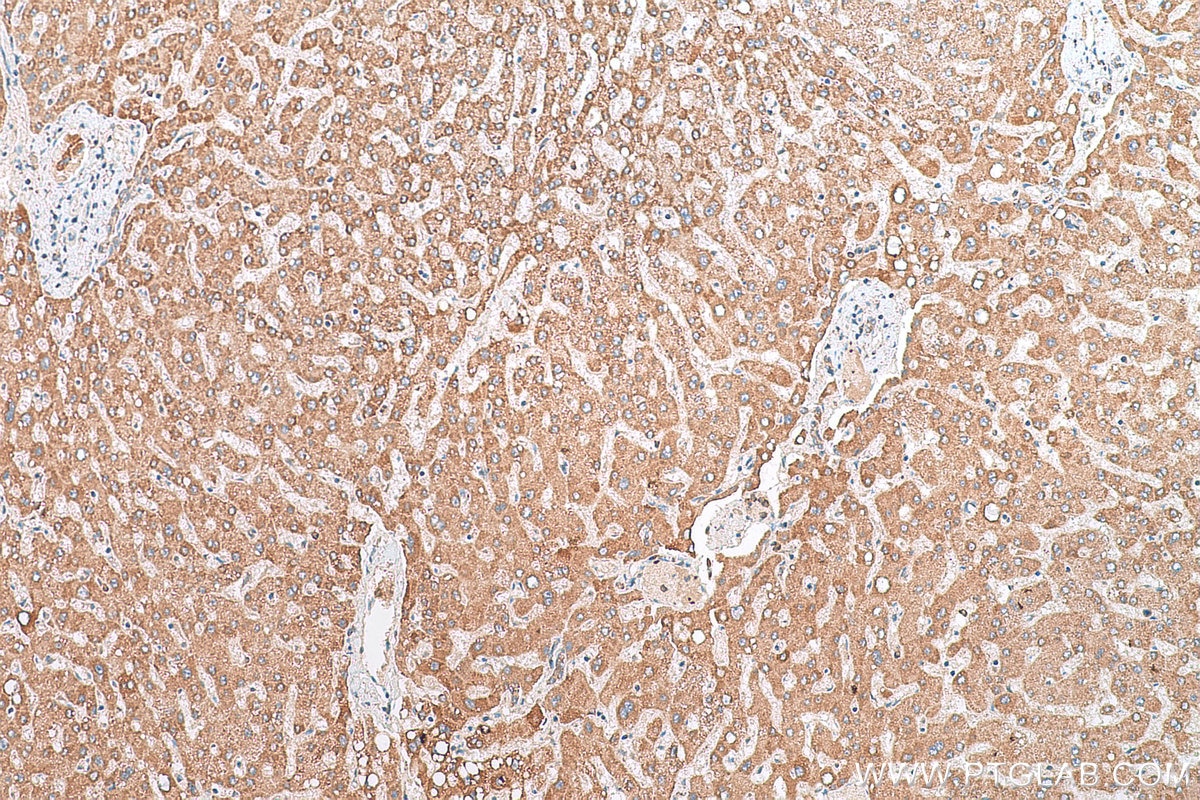Anticorps Polyclonal de lapin anti-BCKDHA
BCKDHA Polyclonal Antibody for IHC, WB, ELISA
Hôte / Isotype
Lapin / IgG
Réactivité testée
Humain, rat, souris
Applications
WB, IHC, ELISA
Conjugaison
Non conjugué
N° de cat : 30028-1-AP
Synonymes
Galerie de données de validation
Applications testées
| Résultats positifs en WB | tissu hépatique de souris, cellules HepG2, tissu hépatique de rat |
| Résultats positifs en IHC | tissu hépatique humain, il est suggéré de démasquer l'antigène avec un tampon de TE buffer pH 9.0; (*) À défaut, 'le démasquage de l'antigène peut être 'effectué avec un tampon citrate pH 6,0. |
Dilution recommandée
| Application | Dilution |
|---|---|
| Western Blot (WB) | WB : 1:2000-1:16000 |
| Immunohistochimie (IHC) | IHC : 1:200-1:800 |
| It is recommended that this reagent should be titrated in each testing system to obtain optimal results. | |
| Sample-dependent, check data in validation data gallery | |
Applications publiées
| KD/KO | See 1 publications below |
| WB | See 2 publications below |
Informations sur le produit
30028-1-AP cible BCKDHA dans les applications de WB, IHC, ELISA et montre une réactivité avec des échantillons Humain, rat, souris
| Réactivité | Humain, rat, souris |
| Réactivité citée | rat, souris |
| Hôte / Isotype | Lapin / IgG |
| Clonalité | Polyclonal |
| Type | Anticorps |
| Immunogène | BCKDHA Protéine recombinante Ag32613 |
| Nom complet | branched chain keto acid dehydrogenase E1, alpha polypeptide |
| Masse moléculaire calculée | 50 kDa |
| Poids moléculaire observé | 42-50 kDa |
| Numéro d’acquisition GenBank | BC008933 |
| Symbole du gène | BCKDHA |
| Identification du gène (NCBI) | 593 |
| Conjugaison | Non conjugué |
| Forme | Liquide |
| Méthode de purification | Purification par affinité contre l'antigène |
| Tampon de stockage | PBS avec azoture de sodium à 0,02 % et glycérol à 50 % pH 7,3 |
| Conditions de stockage | Stocker à -20°C. Stable pendant un an après l'expédition. L'aliquotage n'est pas nécessaire pour le stockage à -20oC Les 20ul contiennent 0,1% de BSA. |
Informations générales
branched chain keto acid dehydrogenase E1, alpha polypeptide (BCKDHA), the gene encoding the regulated subunit of BCKDC was only one of two primary susceptibility genes identified that affected the risk of both type 2 diabetes mellitus (T2DM) and obesity (PMID: 25287287). BIX01294 transcriptionally downregulated the transcription of BCKDHA, which is essential for fueling the tricarboxylic acid (TCA) cycle. Studies have shown that KDM3A, a Jumonji histone demethylase, epigenetically regulates BCKDHA expression by binding to the BCKDHA gene promoter (PMID: 34876693). Moreover, at least four genes including BCKDHA, branched chain keto acid dehydrogenase E1, beta polypeptide (BCKDHB), dihydrolipoamide dehydrogenase (DLD), and dihydrolipoamide branched chain transacylase E2 (DBT) have been reported to be the causative gene for Maple syrup urine disease (MSUD) (PMID: 34187135).
Protocole
| Product Specific Protocols | |
|---|---|
| WB protocol for BCKDHA antibody 30028-1-AP | Download protocol |
| IHC protocol for BCKDHA antibody 30028-1-AP | Download protocol |
| Standard Protocols | |
|---|---|
| Click here to view our Standard Protocols |
Publications
| Species | Application | Title |
|---|---|---|
Clin Nutr The effects of vitamin B6 on the nutritional support of BCAAs-enriched amino acids formula in rats with partial gastrectomy | ||
J Thromb Haemost Branched-chain amino acids promote thrombocytopoiesis by activating mTOR signaling
|





